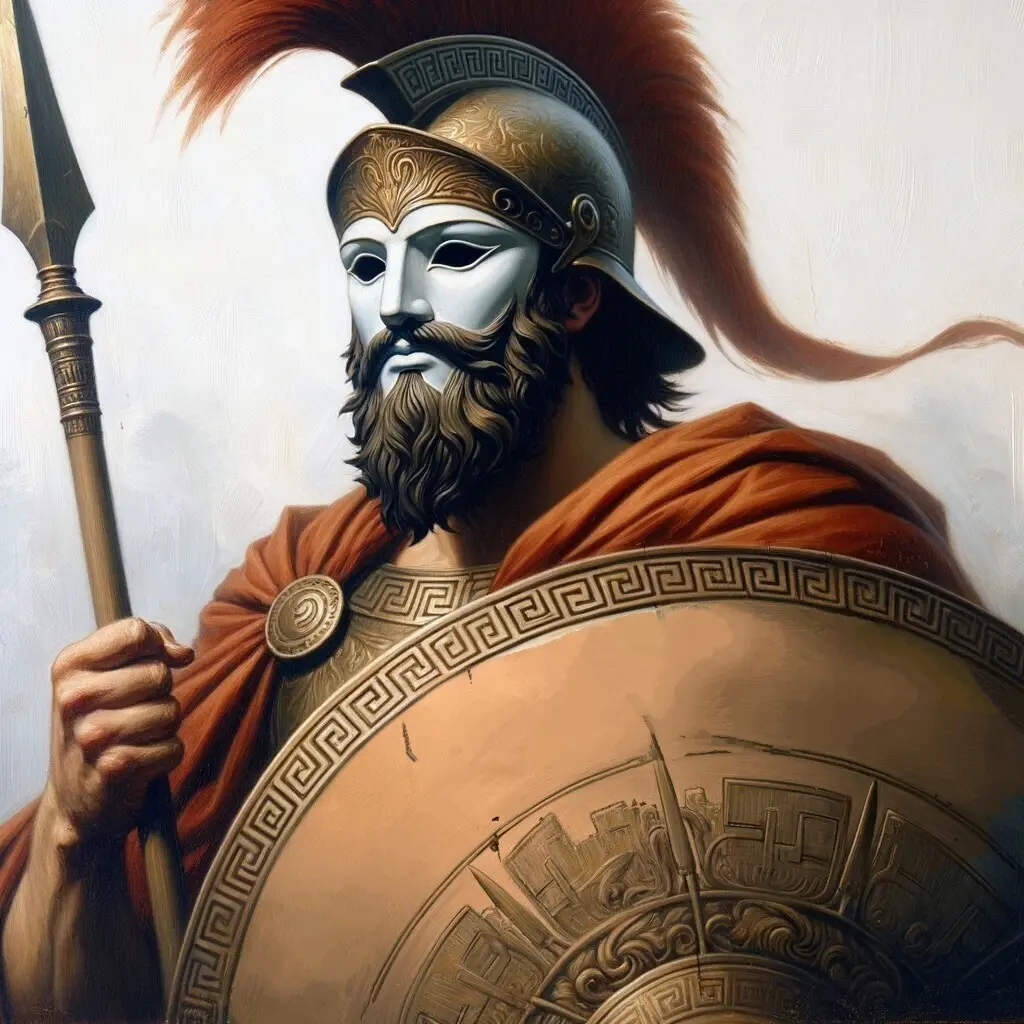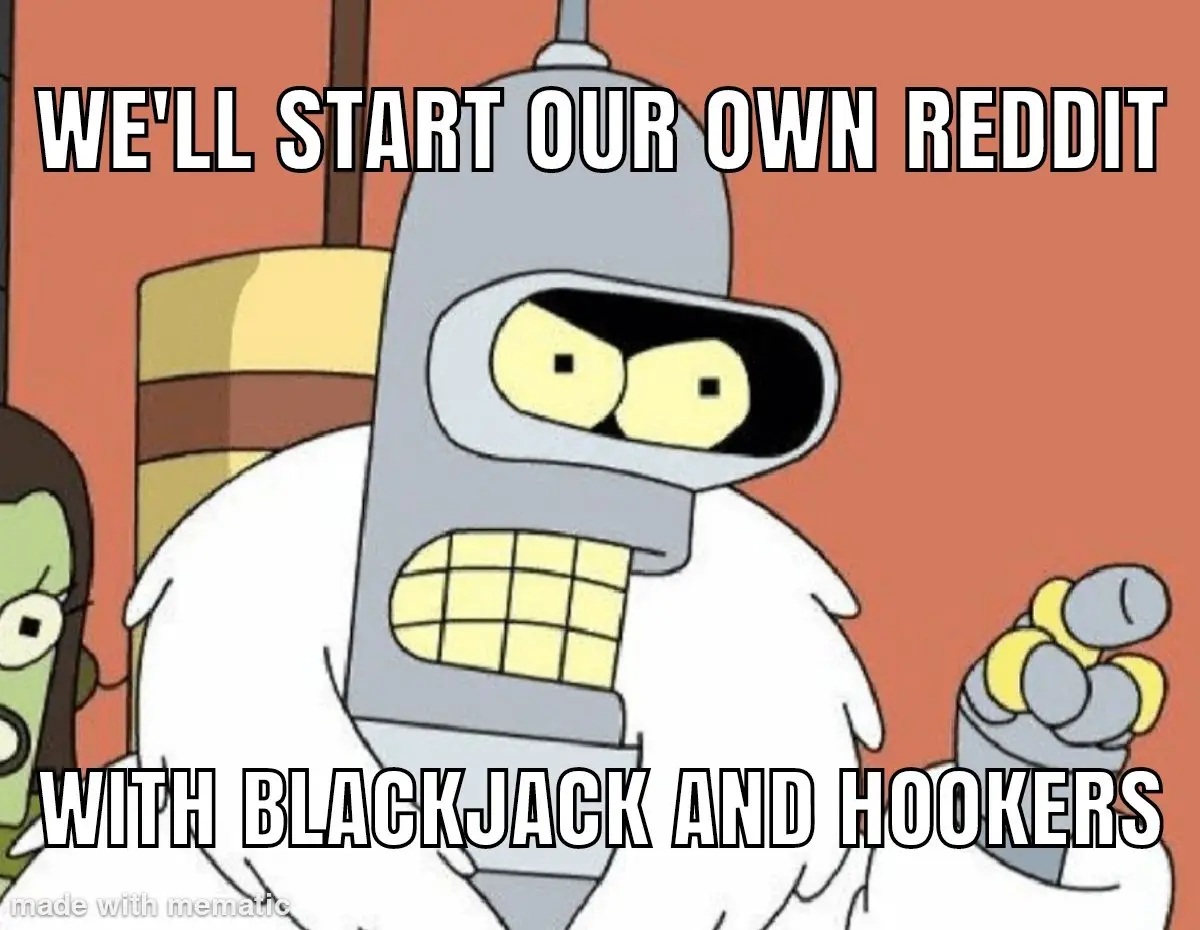I’m not catholic, but I do like the fact that artillery has its own patron saint.
Praise the Lord and pass the ammunition.
I’ll tell you the same thing I told a friend that was too deep into W40K: you can enjoy the characters without making the lore a central part of your life!
Let your friend have fun
That friend was me
May the machine god guide you to better understanding and watch over the functioning of your machine.
I want you to know that I’m screenshotting this comment (and the one you’re replying to) to send to a friend, who will find it very funny.
I want you to know that’s cool with me!
Saint Barbara, patron of artillery men and military engineers.
In the hispanosphere, we used to call “santa barbara” to the ammunition storage of sailing ships. Now i know why
Fun fact of the day: That is why the little columns on which gun turrets are mounted are called ‘barbettes’ (little barbara)
And miners
For all Protestants bang on about hell and the devil, they are well on their way to paganism too.
We all just want cool lore
Too bad it was stolen from Greek lore
All religions steal from prior religions, it’s all about who makes up the best story. The best religious memes survive and spread.
An all-loving god sentencing sinners to eternal damnation is bad writing. Plus it ethically justifies ANY atrocity if the atrocity is done in service of converting ONE sinner. One person going to hell is worse than a million holocausts. A Christian who believes in hell can justify doing anything to “save souls”. Conversion therapy, witch burnings, crusades… If it keeps one person out of hell, it was worth it. That’s not a good mindset.
It’s about conversion, control, and propagation of religious ideas. It isn’t about making the nicest fairytale.
As a Catholic, it’s slightly grating for most criticisms regarding Christianity to just be reactions to the most obnoxious Protestants.
(for reference,
- not being a Christian isn’t a sin
- while it is required to believe a Hell exists, there is no requirement to believe anyone is there
- we don’t ever purport to know whether anyone is there or not
- https://64.media.tumblr.com/c687504931fcc8f598b1eba5157ec59f/930251a53f94acd8-e8/s1280x1920/deb1ae7d735c691b97d3766207fcd10da8eae4a1.pnj
- free choice/will is paramount
- we break sins into veneal and mortal
- mortal sins are the ones that send you to Hell
- you cannot commit a mortal sin without full knowledge that what you’re doing is wrong and choosing so anyway
- we may not necessary be clear on the hows/whys/details but it follows that anyone in Hell is there because of deliberate choice on their part
- again, not believing isn’t a sin
- see previous point about the possibility no one is there
- we break sins into veneal and mortal
Not to say that Catholicism doesn’t have things it can be criticized for (Lord knows) but I know the type of Christians your taking about and it’s just so far and beyond removed from our actual theology)
it’s slightly grating for most criticisms regarding Christianity to just be reactions to the most obnoxious Protestants
I mean, the first thing I think of when I think “Christians” is “paedophile priests like Cardinal Pell” whom the Pope himself protected.
But yeah, after that one thing, most of the criticisms I have of Christianity fall more heavily on Protestants than Catholics. It’s just…that one thing is pretty damn fucking huge.
again, not believing isn’t a sin
I must admit, I find this genuinely fascinating. I had thought it was pretty standard Christian doctrine that belief in Christ is a prerequisite for getting in to heaven. Is that not the case? And, assuming it isn’t official doctrine, do you think most Catholics are aware of the official doctrine, or would they believe, as I did, that belief in Christ is necessary?
I mean, the first thing I think of when I think “Christians” is “paedophile priests like Cardinal Pell” whom the Pope himself protected
…yeah; that’s exactly – if anything – the one criticism I had in mind, when I wrote that. Definitely no protest from me, on that one. While there is much I’d hoped for with Francis’s papacy, his inaction and stonewalling on this will likely end up being the largest blight on his job.
It’s just…that one thing is pretty damn fucking huge.
Yep; absolutely.
I must admit, I find this genuinely fascinating.
Heh, I think most do.
I had thought it was pretty standard Christian doctrine that belief in Christ is a prerequisite for getting in to heaven. Is that not the case?
So it is (I think the reasoning here is that, if God is the source of all Goodness and morality, rejecting belief in him necessitates rejecting God and, thus, belief in Him) but, like I mentioned, it’s Catholic belief that, in order for anything to warrant Hell, it just be willfully chosen. We don’t believe that God just punishes people because he can; that’d contradict a loving God (which we purport He is) and, also, collapse any point of morality. To quote Pope Pius IX (in 1863), “God[…]in His supreme goodness and clemency, by no means allows anyone to be punished with eternal punishments who does not have the guilt of voluntary fault.”
The second Vatican Council, based on the history of teachings such as these, said (in 1964), “For they who[…]seek God with sincere heart, and try, under the influence of grace, to carry out His will in practice, known to them through the dictate of conscience, can attain eternal salvation.”
Basically, you know how atheists always whip out against Evangelicals, “Well, what is someone was born somewhere where they didn’t know about Christianity? Would they go to Hell?” And we were like, “That’s a really valid point; a loving God wouldn’t do that. There’s gotta be another answer, there.”
And, assuming it isn’t official doctrine, do you think most Catholics are aware of the official doctrine, or would they’re believe, as I did, that belief in Christ is necessary?
So one of the phrases the Vatican II council used when discussing this topic was “invincible ignorance”. What constitutes an invincible ignorance such that you’re off the hook? Ehh…the Church doesn’t say, yet (I think the thing a lot of people don’t realize is how…definitional the Church is; people read something that was promulgated and read the possible interpretations of that statement into it but, really, what the Church is trying to do is take a lot of the Unknown and try to precisely define it so we can understand it, over time; which means we can say, “This is true,” even if we don’t understand, yet, examples of the thing).
So there are a lot of Catholics out there who will be quick to remind you, “Ah! Invincible ignorance; it’s not a everything-goes card. Were you really so ignorant that you can be without blame?” If you want to get into Catholic tea and drama, the statements promulgated in Vatican II aren’t dogma so it’s always possible they may get reversed, in the future; there’s a contingency out there who believes the whole council was bunk and beliefs like this are exactly why. Don’t get it twisted, all the nonbelievers will burn.
I find…both positions repulsive. But they are out there. And, while the later group hates all the doctrinal development over the last century and is, like, a hair-breadth away from schism, they are (at this point in time) technically valid positions based on what’s been said by the Church, so far.
For me, someone seeing the absolute abysmal and shameful way the hierarchy has handled the pedophilia crisis and thinking, “I…don’t think that’s where God is,” could easily count as invincible ignorance. How could anyone of reasonable conscience not?
I think the atheist who genuinely can’t believe that there is a God out there or find enough evidence but (to use the old cliche) is just focusing on doing his best to be a good person could count as invincible ignorance.
Maybe I just can’t believe in a God that would send the many friends and family I think are amazing people to Hell over something they genuinely can’t find convincing but, well, I don’t; and I know there are many Christians (including Catholics) who would find this about me to be weak reasoned and borderline vile but clearly I’m not the only Catholic who does.
So – to more directly answer your question – I can’t say if there’s many but they definitely are out there. I wouldn’t be surprised, if we include the less consistently practicing Catholics (the many only-show-up-to-Mass-for-holidays-but-pray-often), that there are many Catholics who would prefer to take my interpretation. Most people don’t like to enforce suffering, I believe.
But it’s undeniable that, at least at this point in time (though there’s a long history so I don’t think that’s getting reversed), – for Catholicism – being aware of something is a part of the equation for it to be sinful; quotes from the current Catechism: https://www.catholiccrossreference.online/catechism/#!/search/1735 1746 1859
Is emitting carbon a mortal sin? Helping end all life on earth seems like some major grade heresy to drag, and a sixth commandment violation. If you know climate change is real and caused by humans, is driving a car a mortal sin?
I mean, they’re good questions. I don’t know if knowing the answer is simple, though.
I would say that I’d think any conception of a Just or Good god would take into account one’s level of power in a system, though.
A CEO who has access to the data and the power to do something? I expect you could make the argument yes.
I think the average person who has to use a car because it’s the only way to get to the job which feeds their family is probably not committing a mortal sin.
And I think it’s fair to consider cases where a person may be aware of the data (and able to transfer away from a car by making changes in their life) but not fully register how they contribute to it to be cases where we might argue that they aren’t fully aware that they’re doing wrong or harm.
This is so true! There was a true Cambrian explosion of holy men and mystics in the first century in the eastern Roman Empire. Christianity was the one that out-competed them all. The best brain worm. The two thousand year meme.
That the Greeks stole from Egyptians and Phoenicians.
who stole from “atlantians”
It’s spelled Assyrians
Hey they impressed the west early. No hope or chance when we’re trying to aspire to Olympus
Not just Catholics. Father, son, holy spirit, Satan, but just one god, amirite?
I’m guessing you don’t come from a region that has been historically Abrahamic. I’m secular myself but it’s interesting that you would throw Satan in there with the rest.
I do, and I’m not sure why what I said would make you think otherwise. The way Satan is popularly depicted today makes him indistinguishable from the “evil gods” of other religions.
Well, the way Satan is depicted in pop culture has little to do with actual christianity, and I am not sure why you felt the need to include him, despite the fact he is a very minor character in christianity, and also even in the popular depiction he is not nearly on the same level, as he was created by God, is not omnipotent, omniscient, unlike God, etc.
Listen to Evangelicals rant about Satan. They won’t say he’s on the same level,. but they act like he is.
Evangelicals are decidedly not Catholic
Yes, notice I said not just Catholics. This meme is referring to the saints.
If Satan is less powerful, that means god can stop evil but chooses not to?
Oh boy… I think there have been entire books written about this argument like , 100’s of years ago?
Google “theodicy”.
I’ll give that a read later and reply after
Either that or:-
-
is not as powerful as advertised
-
has a different definition of evil
-
doesn’t exist
Maybe some other possibilities.
One of which that I’m aware is: the devil was deliberately created with the knowledge of its future rebellion to test the faith of people. Another is to wait for them to repent. I don’t follow any more, but deeper into catholicism there’s a surprising amount of theory. For a religion with an organized structure, it’s not very organized.
-
Satan doesn’t do evil. He merely tricks people into doing evil. Kind of like a criminal lawyer than an evil god.
he is a very minor character in christianity
In the text, definitely. In the practiced religion (especially in America), not so much. And even in the text he has a much larger role than in its predecessor Judaism.
I think the pop culture versions of religions have become so deeply ingrained that they became a part of many adherent’s actual beliefs. For example, ask the average Catholic to describe hell and see how long it takes for something from Paradise Lost to pop up.
even in the popular depiction he is not nearly on the same level, as he was created by God, is not omnipotent, omniscient, unlike God, etc.
Why would that disqualify him as god-like? Polytheistic religions had gods of varying strengths, many created by other gods - the Greek pantheon is a tangle of lesser gods created by greater ones, and even Zeus came from Chronos, a Titan (which is somehow different from a god).
The whole assigning of godhood seems completely arbitrary to me. Archangels are more powerful than many full-on gods from other mythologies yet somehow don’t count, whereas even humans could have been (or will become) gods in other lives in religions such as Jainism or Mormonism.
Ok, I will concede to you that pop culture should be considered, however I would not say angels are gods.
The christian God is the supreme power, he is the monarch of the universe, so to speak, everything is under his authority. An angel is not a god, because he is a creature, not the creator, he is subordinate. He is not all-powerful, he is a servant. Within the logic of christianity there is absolute difference between god and everything else.
In greek paganism Zeus was the king of the gods. However, he was not allpowerful(there were some henoteistic tendencies, however), other gods were still powerful in their own right, and there were gods he was afraid of(in a famous passage from the Iliad that I do not quite remember, it is mentioned that he was afraid of Nyx). There was a revolution when Kronos was overthrown, as you mentioned. So those two religions are quite different.
In Jainism, the so called “gods” are a different thing altogether, no need to mention it.
I do not know much about mormons, aren’t they christians? I thought they were.
My point is that what constitutes a god differs between religions, and the Christian claim of monotheism uses a very narrow definition of god that excludes the many supernatural beings described in their religious texts.
If you use the standards of other religions, one could easily argue it’s a polytheistic religion - the Trinity, or one divinity appearing in multiple forms, is similar to other religions generally considered polytheistic.
It’s an endless debate because both sides talk past each other due to disagreeing on the basic definition of the term.
I do not know much about mormons, aren’t they christians? I thought they were.
That’s a matter of debate I’m not at all qualified to get into. They have some very out there beliefs that they understandably don’t advertise to outsiders, and that only became common knowledge with the advent of the internet.
Yes, gods are different in different religions, but why would you, to determine whether something is a god in christianity use pagan standards?
My point is, that within the logic of christianity you can not say there is more than one god, it is unreasonable to say that christianity is polytheistic.
Also, “one divinity appearing in multiple forms” is not a polytheistic thing, since you only have one divinity. The trinity does not consist of three gods, but of three hypostases of the same god. My point is that it can only seem like those are three gods, but if you have more deep knowledge of christianity you will never say that.
Back when I still went to (Catholic) Church I don’t remember ever hearing about Satan/the devil/Lucifer/whatever
Catholics don’t tend to obsess over him like Evengelicals, that’s for sure.
Older versions of the Bible contain references to “Hades” which was changed to “hell” in the King James Version.
True if all of your knowledge of religion comes from pop culture I can see how someone might see it that way.
Like in Family Guy or other Seth Rogan shows Satan, Jesus and “God” are all depicted as equals bickering.
Thanks for your thoughts here. They’re interesting.
Yes yes, it’s actually a fallen angel, servant of god. Same animal, different cloth.
No pop culture needed, just listen to Evangelicals. To hear them tell it, Satan is this huge powerful force that meddles in human affairs constantly.
That just sounds like evangelicals.
Yes, and guess which type of Christianity is in power in the US now?
Oh is it the one full of hypocrites?
American christianity is basically zoroastrianism
American Christianity has very little to do with the Bible.
I mean Americans do a lot of dumb stuff. And I don’t think we need to make every thread American centric.
One god, multiple personalities. They didn’t have schizophrenia medication back then.
Maybe that one god is just plural
Imagine religious people realizing God’s pronouns are actually they/them
I do know an Anglican priest-in-training who refers to God with They/Them pronouns because thinking of God in a monogender way is weird to them. This apparently isn’t particularly controversial within their mini community, although there was a big argument once when someone suggested that capitalised pronouns (such as He/Him or They/Them) technically means God uses neopronouns
I get the joke, but I just want to clarify to readers that plurality does not imply they/them pronouns.
And Trump if you’re a conservative American
The way I look at it is basically the Bible is up for interpretation. Because if you read it literally it uh… Well it’s not good.
So if you think about it, there are actually several. Christian gods. Each one slightly different based on which verses of the Bible you interpret literally versus figuratively.
no ; its just satan
And a few dotzen tin gods and holy requisites.
Hinduism is a very diverse religion. There are polytheistic, monotheistic, pantheism and many more under that umbrella
Choose your own deity kinda situation
Not exactly. For some yes but that’s the polytheistic part. Different from (early) Judaism, monotheistic Hinduism isn’t “my God is the only one” but more like “the god we already agreed to be one of the main gods is actually the only one and the others are expressions of this one or lesser beings”. There are 2 or 3 candidates for that but all are very canonically important in all of Hinduism. There is still a lot of diversity and it’s more about which school you belong to. I think some have a more abstract way where it’s not a specific god but more the dualistic idea of a Big Other if that makes sense. There are also non dualistic schools which fit more into pantheism (god=universe). I simply a lot and I’m already no expert. Let’s Talk Religion has a good series on YouTube about Hinduism.
There are 2 or 3 candidates for that
I’ve never heard that. I’ve always heard that Brahman = God, the Trimurti (Shiva, Vishnu, Brahma) are the three main “aspects”, and every other “god” is a further “subdivision” thereof.
I finally took the time to rewatch this video and Vishnu and Shiva have their cults who worship them as main god next to other lesser gods. I think what you are referring to is within vendata hinduism which isn’t explained in the linked video but the video is still worth watching.
It was my understanding that even then, Vishnu and Shiva are aspects of Brahman. It’s just that Brahman is so abstract and transcendent that you don’t really “worship”. If you view worship as a form of evocation, Brahman doesn’t really give you any attributes to focus on.
It’s like playing music to evoke a mood. Holding down every key of an organ can only really convey the idea of “EVERYTHING, undifferentiated”. It’s certainly a compelling idea, but it lacks nuance and texture. If you want to convey something more “useful”, you have to be more selective.
From my understanding, this is the philosophical turn, vendata represents. This doesn’t effect all of today’s Hinduism. I read a little bit of Hare Krishna as a young adult and they stressed very much that Krishna is the highest personal god as in there are other gods as well but Krishna is the highest and it’s a personal god, not just a representation of an abstract idea. I don’t know what role Brahman plays in their view though.
Krishna isn’t even really part of the Trimurti, he’s an avatar of Vishnu. You could draw parallels to Christ, “personal” is a crucial qualifier there.
But if you choose wrong you get beaten. Religion is cool like that.
Can someone with knowledge on Hinduism explain a bit?
Hindus believe in a universal consciousness, of which there are many facets which manifest deities such as Vishnu, Brahma and Shiva, but there are dozens, and their wives. People pray to one for financial matters, another for health, and another for happiness.
Ultimately though, the peak of divinity is not asking for anything, but contemplating the divine spirit, the universal consciousness and accepting that he is within uus, and we are within him, and that our lives are karma-bound, and benevolence towards others regardless of our station in life is the only goal and the only way to move up the karmic ladder towards eventual oneness with the UC. Yogis believe they can speedrun the karmic ladder, for want of a better term.
Full disclosure, I’m a hon-hindu white boy
Edit: The audiobook Everyday Gita, by Sunita Pant Bansal is an excellent, down to earth, non-preachy guide to Hinduism and my main source for this description. I don’t agree with everything in it, as it defends the indian caste system and seems to defend capitalism and tolerates billionaires, but it’s still a useful text/audiobook
The way that someone explained it to be once is that if we think about the typical monotheistic, omnipotent, omniscient God — surely a God would be far more than what humans can comprehend at all, right? So any single characterisation of God is going to seem weirdly limited, because it’ll be grounded in our human perspective. So the idea is sort of like God™ is like a diamond, and each of the Hindu Gods is like a facet of that gem. The problem is that our human perspectives can’t understand the diamond (similar to how visualising 4D shapes like a tesseract is trippy and hard) so we have to try to understand the diamond by looking at each of its facets and trying to imagine an entity that can be all of those things at once.
As someone who is neither Hindu or Christian, it reminds me of the Holy Trinity: that God is the Father, the Son, and the Holy Spirit.
Hindu lore hosts many characters, but in actuality they believe in only one god, the godhead that you are i.e. the universe, man, life, existence is all one thing and you’re it.
I don’t see the history of Hinduism with Christianity. Back in the day when Christians went to just and set up missions in Hindu regions they were successful. They built missions and the Hindus started attending churches of Catholics.
With some time passing the Catholics noticed that the Hindus still went to their own mosques AND went to churches. So they asked why. The Hindus response was “It’s all good. You are all part of Hindu.”
I learned about this in World Religions in college. Loved the high road troll. The one thing that I find interesting about most Christian sects is that they take the teachings literally. Whereas most other philosophies are fully aware of the fables they teach their young is to convey morality.
They do believe in their deities. But they acknowledge that most stories are not historically factual. At least this is what I was taught. I’m not an expert on any of it.
You don’t need pretense to be notheist










